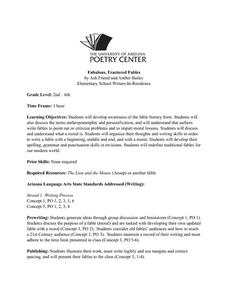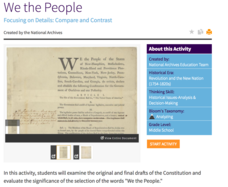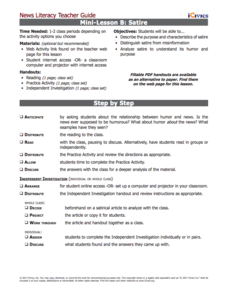National Endowment for the Humanities
Revolution '67, Lesson 1: Protest: Why and How
To some people, protesting is as American as apple pie, but the factors that lead to protests can be as confusing to veteran activists as to today's youth. Revolution '67 explores the riots in Newark, New Jersey as a case study. ...
Curated OER
Fabulous, Fractured Fables
Elementary schoolers develop an awareness of the literary form known as the fable. They explore how authors write fables to pass along moral lessons. After reading and discussing many famous fables embedded in the plan, learners attempt...
Academy of American Poets
Poems about Poetry
Learners of all ages hear the words “Today we’re going to start poetry” and begin their plans to drop out of school. It is not the teacher's fault! Use this resource to help young scholars understand the genre of poetry and why it is...
Perkins School for the Blind
Build a Word
Get out those scrabble tiles and a braille tape labeler because today we are playing a build-a-word game! Label several sets of scrabble tiles using the braille labeler, place them in a box, and have children take turns pulling letter...
Perkins School for the Blind
Matching Like Objects
Same and different, sorting, and tactile discrimination are what's on the agenda for today. The class practices sorting objects and attempts to determine which objects are the same and different and why. The purpose is to increase...
Curated OER
Spider Safari
Today we are talking about one of the stealthiest, sneakiest, and most intriguing insects of all times, the spider. Learners will examine the predatory nature of these super bugs as they conduct a spider safari survey. Each child will...
ICT Evangelist
Think
With the speed and easy access of online communication today, young learners often do not consider the full implications of their speech. Remind them to THINK (is it true, helpful, inspiring, necessary, and kind) before using...
Curated OER
Fluency Passages, 3rd Grade
What would it be like to travel in a covered wagon? Learn about the life of a pioneer with a short informational reading passage. Kids read four paragraphs about traveling in a covered wagon and how it is different than traveling today,...
University of Wisconsin
Why Did the Triangle Fire Occur?
An investigation of the 1911 New York City Triangle Shirtwaist Factory fire leads class members to examine primary and secondary source materials related to the event and apply what they learn about the working conditions at the time to...
T. Smith Publishing
Writing a Friendly Letter
Just because kids today are well-versed in texting and emails doesn't mean they shouldn't learn how to write a friendly letter! Reinforce their letter-writing skills with a lesson focused on the elements of a friendly letter, as...
Curriculum Corner
Observational Drawing
What shall we write about today? The opportunities are endless with a printable that offers space to write and draw a corresponding picture.
Mathematics Assessment Project
Sampling and Estimating: Counting Trees
Your task today: count all the trees on a tree farm. To complete the assignment, learners first estimate the number of trees on a tree farm using random sampling. To improve their own response they then evaluate provided...
Anti-Defamation League
10 Ideas for Teaching Black History Month
Celebrate Black History Month with the help of 10 ideas that delve deep into the history, major events, contributions, famous African Americans, and sheds light on how scholars today can take a proactive stance on current civil rights...
US National Archives
We the People Focusing on Details: Compare and Contrast
Even the most inspiring documents in American history had to go through a few drafts before they were ready for publication. Reinforce the importance of the writing process, as well as the collaborative nature of democracy, with an...
Science Matters
Slip Sliding Along
The San Andreas Fault is the largest earthquake-producing fault in California. In the seventh lesson in the 20 part series, pupils create maps of California, focusing on the San Andreas Fault system. The comparison of where...
Chicago Botanic Garden
Historical Climate Cycles
Ice core samples give scientists access to climates of old—those from more than 800,000 years ago. Through an analysis of various temperature graphs from ice cores, tree rings, and weather stations, scholars compare historical climates...
Chicago Botanic Garden
Climate Change Around the World
You know climate change is happening when you see a bee take off its yellow jacket. Part four in a series of five lessons explores all factors affecting climate change: temperature, cloud cover, precipitation, and carbon dioxide. By...
Chicago Botanic Garden
The Carbon Cycle
There is 30 percent more carbon in the atmosphere today than there was 150 years ago. The first lesson in the four-part series teaches classes about the carbon cycle. Over two to three days, classes make a model of the cycle,...
Cornell University
Constructing and Visualizing Topographic Profiles
Militaries throughout history have used topography information to plan strategies, yet many pupils today don't understand it. Scholars use Legos and a contour gauge to understand how to construct and visualize topographic profiles. This...
Walden Woods Project
19th Century Lessons for 21st Century Lives
The words of Henry David Thoreau on Civil Disobedience seem particularly relevant today, as are his writings and those of other transcendental thinkers who ask what it mean to live deliberately and what are the responsibilities of...
Prestwick House
Death of a Salesman
Arthur Miller's work of American tragedy and frustration is as relevant today as the first day it premiered on stage. Learners review character names and details from Death of a Salesman with a crossword puzzle that contains 27...
Chandler Unified School District
Ben Franklin Aphorisms
Benjamin Franklin's famous aphorisms are a perfect time capsule of colonist values in the mid-18th century, as well as a clever reminder of the way life still works today. Middle and high schoolers select one aphorism to interpret...
Prestwick House
Ten Days to A+ Grammar: Verbs
What are you doing today? What have you done this week? What will you be doing next month? Focus on verb usage with a series of fill-in-the-black exercises on basic tenses, inappropriate shifts in tense, and active and passive voice.
iCivics
Mini-Lesson B: Satire
Hey, what's so funny? Explore the use of satire in a variety of media with a hands-on lesson. Fourth in a five-part journalism series from iCivics, the activity introduces satirical language in print and online. Pupils work alone or in...
Other popular searches
- Today I Feel Silly
- Native Americans Today
- African Americans Today
- Southeast Asia Today
- Have You Filled a Bucket Today
- Today Is Monday
- China Today
- Caste System Today
- Yesterday Today and Tomorrow
- Yesterday Today Tomorrow
- Bison Today
- Comparisons to Today























